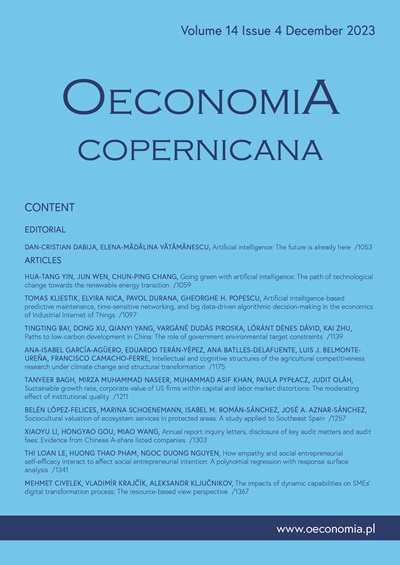民办高校组织承诺、主观活力和倦怠对离职倾向的影响
IF 10.8
1区 经济学
Q1 ECONOMICS
引用次数: 9
摘要
研究背景:私立大学的学院面临着巨大的工作压力,这导致了压力和倦怠。工作倦怠会引发心理压力,从而增加离职意愿。本文的目的:本研究旨在用三元模型评估巴基斯坦私立大学教师的倦怠程度。本研究还旨在检验组织承诺(如情感承诺、规范承诺和持续承诺)的中介作用,以及主观活力在工作倦怠及其组成部分(如疲惫、效能和愤世嫉俗以及离职意向)关系中的调节作用。方法:通过结构化问卷从巴基斯坦私立大学的初级和高级教职员工中收集712份回复。数据采用二阶偏最小二乘法进行检验?结构方程方法?PLS-SEM.Findings&value additions:研究结果表明,情绪耗竭、愤世嫉俗和职业效能感对工作倦怠有直接显著影响。研究结果进一步表明,工作倦怠对教师离职意愿有着令人信服的负面影响。研究结果表明,组织承诺的要素(如规范性、情感性和持续性承诺)在倦怠及其构成要素(如疲惫、效能感和愤世嫉俗)和离职意向之间具有强大的系列中介影响。最后,研究结果表明,主观活力作为工作倦怠与离职意向之间关系的调节变量,具有显著而积极的影响。这项研究有着长期的理论贡献,因为它提供了一个新颖的概念框架,可以在不同的行业中复制。因此,这种独特的模式提供了减少员工的解决方案?其他行业的营业额。本文章由计算机程序翻译,如有差异,请以英文原文为准。
Assessing the organizational commitment, subjective vitality and burnout effects on turnover intention in private universities
Research background: Faculties of private universities are under immense working pressure, which causes stress and burnout. The job burnout triggers the psychological pressure, which increases the turnover intention.
Purpose of the article: The undertaken study aims to evaluate the scale of burnout with its three-element model, which affects faculty members of private universities of Pakistan. This research also aims to examine the mediating effect of organizational commitment (e.g., affective, normative & continuance commitments), and moderating influence of subjective vitality in a relationship of job burnout and its constituents, for example exhaustion, efficacy & cynicism, and the turnover intention.
Methods: The 712 responses were collected through a structured questionnaire from the junior and senior faculty members of private universities of Pakistan. The data was examined by using second order partial least square ? structural equation approach ? PLS-SEM.
Findings & value added: The research findings exhibited that emotional exhaustion, cynicism, and professional efficacy have a direct significant influence on job burnout. The findings further demonstrated that the job burnout has a cogent and negative impact on faculty turnover intention. The findings demonstrated that elements of organizational commitment (e.g., normative, affective & continuance commitments) have a forceful serial mediating influence between burnout & its constituents for example exhaustion, efficacy & cynicism, and turnover intention. Finally, the findings have revealed that subjective vitality has a significant and positive impact as a moderating variable in a relationship between job burnout and turnover intention. This research has a long-term theoretical contribution, as it provides a novel conceptual framework, which can be replicated in different industries. Thus, this unique model provides the solution to reduce employees? turnover for other industries as well.
求助全文
通过发布文献求助,成功后即可免费获取论文全文。
去求助
来源期刊

Oeconomia Copernicana
ECONOMICS-
CiteScore
13.70
自引率
5.90%
发文量
26
审稿时长
24 weeks
期刊介绍:
The Oeconomia Copernicana is an academic quarterly journal aimed at academicians, economic policymakers, and students studying finance, accounting, management, and economics. It publishes academic articles on contemporary issues in economics, finance, banking, accounting, and management from various research perspectives. The journal's mission is to publish advanced theoretical and empirical research that contributes to the development of these disciplines and has practical relevance. The journal encourages the use of various research methods, including falsification of conventional understanding, theory building through inductive or qualitative research, first empirical testing of theories, meta-analysis with theoretical implications, constructive replication, and a combination of qualitative, quantitative, field, laboratory, and meta-analytic approaches. While the journal prioritizes comprehensive manuscripts that include methodological-based theoretical and empirical research with implications for policymaking, it also welcomes submissions focused solely on theory or methodology.
 求助内容:
求助内容: 应助结果提醒方式:
应助结果提醒方式:


